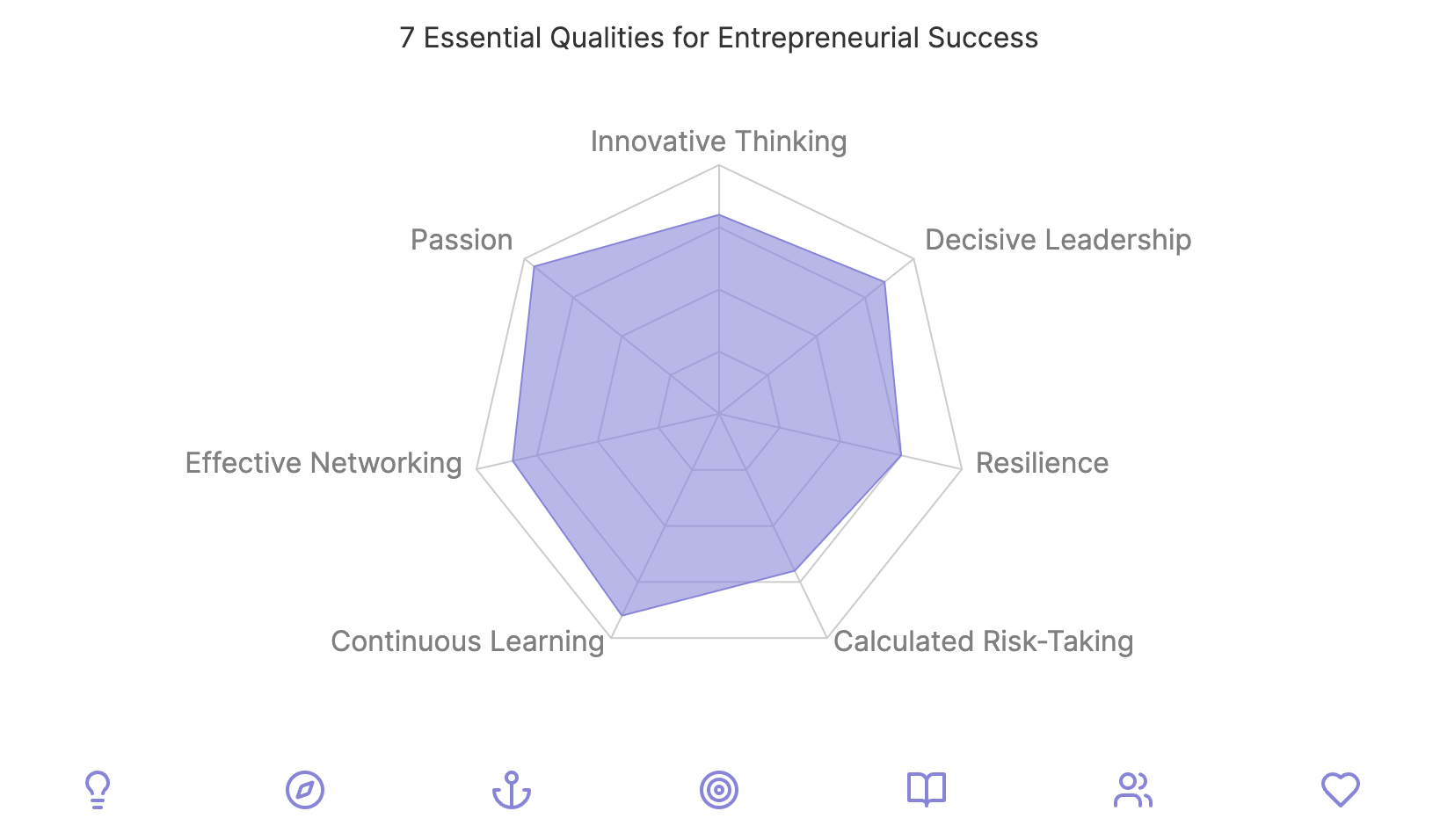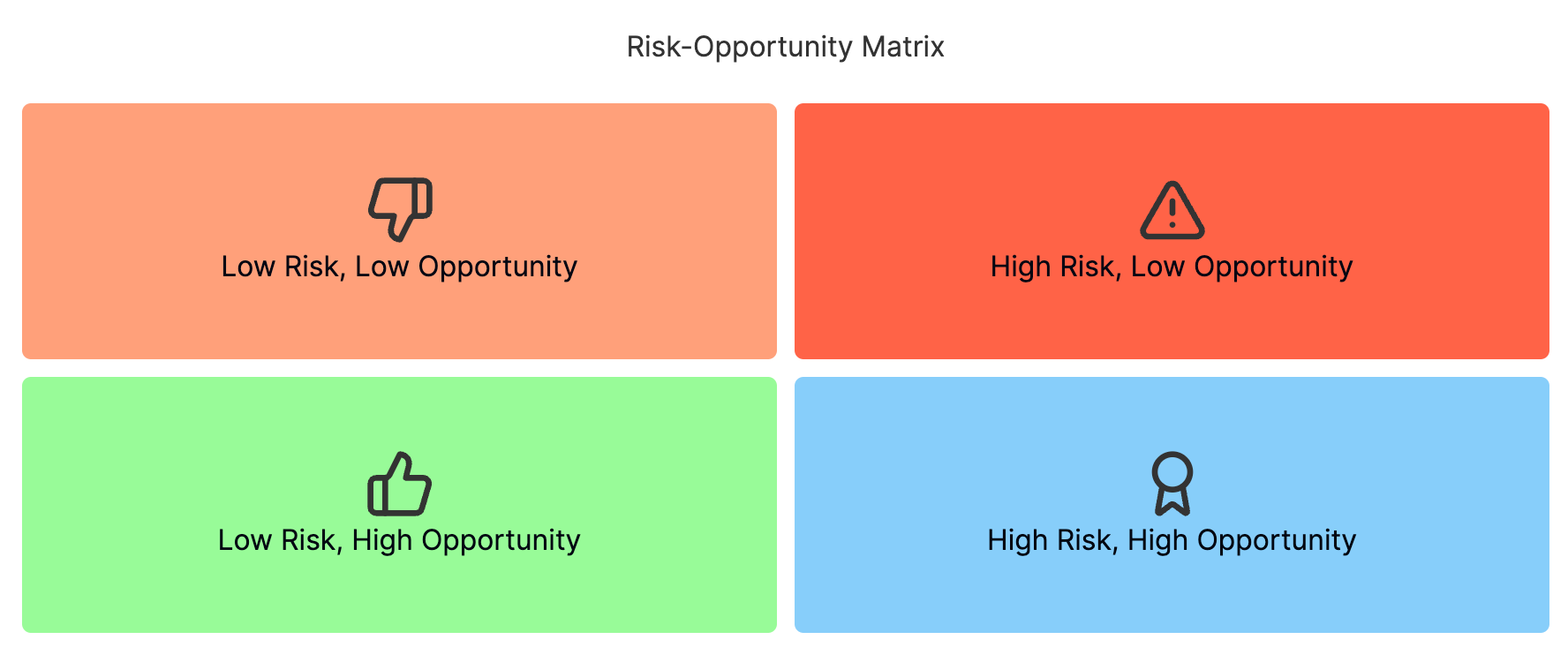In the dynamic world of business, entrepreneurship stands as a beacon of innovation, growth, and opportunity. But what separates successful entrepreneurs from those who struggle? The answer lies in a unique set of traits that drive entrepreneurial success. In this comprehensive guide, we’ll explore the seven essential qualities that empower entrepreneurs to thrive in today’s competitive landscape, including the vital entrepreneurial spirit that allows individuals to seize opportunities and overcome challenges.
Understanding Entrepreneurial Success Strategies
Before diving into the specific traits, it’s crucial to understand what entrepreneurial success truly means in the modern business world. Entrepreneurial success goes beyond mere financial gains; it encompasses the ability to create sustainable value, drive innovation, and make a positive impact on society.
Successful entrepreneurs tend to build profitable and scalable business models, create innovative solutions to real-world problems, and adapt to changing market conditions. They foster a positive company culture and achieve personal fulfillment alongside work-life balance. The impact of personal traits on business outcomes cannot be overstated. Successful entrepreneurs leverage their unique qualities to navigate challenges, seize opportunities, and lead their teams to achieve remarkable results.
Self-awareness is essential for understanding one's strengths and weaknesses and building diverse teams that enhance collective success.

Essential Quality #1: Innovative Thinking and Creativity
At the heart of entrepreneurship lies the ability to think innovatively and creatively. This quality drives entrepreneurs to challenge the status quo and develop groundbreaking solutions. Innovation is not just about inventing new products; it's about finding novel ways to solve problems, improve existing processes, and deliver value to customers. Successful entrepreneurs constantly seek ways to differentiate their offerings and stay ahead of the competition.
To foster creativity in business, entrepreneurs can encourage diverse perspectives within their team, practice brainstorming and idea generation exercises regularly, and create a work environment that supports experimentation and risk-taking. Staying curious and open to learning from various industries and disciplines is also crucial.
Consider the story of Airbnb. When founders Brian Chesky and Joe Gebbia were struggling to pay rent, they came up with the innovative idea of renting out air mattresses in their apartment. This creative solution to a personal problem evolved into a global platform that revolutionized the hospitality industry, demonstrating how innovative thinking can transform a simple business idea into a successful venture.
Before you dive into our in-depth analysis, we have a quick request:
If you find this content useful, please consider sharing it!
Why? Your shares help us reach a wider audience, allowing us to continue producing high-quality, comprehensive content like this—completely free, with no paywalls or subscriptions.
Thank you for your support!
Essential Quality #2: Decisive Leadership and Strategic Vision
Successful entrepreneurs possess the ability to make tough decisions and chart a clear course for their business venture. Developing a clear business vision and strategy serves as a north star, guiding decision-making and inspiring the team. Business partners play a crucial role in this process, helping to develop a strategic vision and make informed decisions. To develop a strategic vision, entrepreneurs should identify their company’s core values and mission, analyze market trends and customer needs, set ambitious yet achievable long-term goals, and break down their vision into actionable milestones.

Entrepreneurship often requires making difficult choices with limited information. Successful entrepreneurs gather relevant data and seek expert advice when needed, trust their instincts while remaining open to feedback, and take responsibility for their decisions while learning from outcomes. Balancing confidence with humility in leadership is key. While confidence is crucial for inspiring others and pushing through challenges, humility allows leaders to remain open to new ideas and admit when they’re wrong.
Essential Quality #3: Resilience and Adaptability in the Face of Challenges
The entrepreneurial journey is fraught with obstacles and setbacks. Resilience and adaptability are crucial for long-term success. Resilient entrepreneurs view failures as learning opportunities rather than defeats. They analyze what went wrong without dwelling on mistakes, maintain a positive outlook, focus on solutions, and use setbacks as motivation to improve and innovate.
In today's fast-paced business environment, the ability to pivot and adapt is essential. Successful entrepreneurs stay attuned to market trends and customer feedback, regularly reassess their business model and value proposition, and embrace change as an opportunity for growth. They understand that unforeseen circumstances can arise at any time and are prepared to adjust their strategies accordingly.
Take inspiration from James Dyson, who went through 5,126 failed prototypes before creating his revolutionary vacuum cleaner. His persistence and adaptability in the face of repeated failures ultimately led to the creation of a multi-billion dollar company. This example illustrates how resilience and adaptability can drive entrepreneurial success even in the face of seemingly insurmountable challenges.
Essential Quality #4: Calculated Risk-Taking and Opportunity Identification
Entrepreneurship inherently involves risk, but successful entrepreneurs know how to take calculated risks and identify promising opportunities. To make informed decisions about risk, entrepreneurs should conduct thorough market research and financial analysis, develop contingency plans for various scenarios, start small and test ideas before making large investments, and diversify risks when possible.

Successful entrepreneurs have a keen eye for spotting gaps in the market and emerging trends. They stay informed about industry developments, listen closely to customer pain points, and network with other professionals to gain diverse perspectives. The balance between risk-taking and prudent decision-making is crucial. While taking risks is necessary for growth, it's equally important to make prudent decisions that protect the business. Entrepreneurs should strive for a balance between bold moves and careful planning.
Essential Quality #5: Continuous Learning and Self-Improvement
In the rapidly evolving business landscape, a commitment to lifelong learning is crucial for entrepreneurial success. Continuous learning helps entrepreneurs stay ahead of industry trends, develop new skills to address business challenges, and inspire innovation within their organizations. Strategies for staying updated in a rapidly changing business environment include reading widely (books, industry publications, and academic journals), attending conferences and workshops, engaging in online courses and webinars, and seeking mentorship from experienced professionals.

Many successful entrepreneurs, like Bill Gates and Warren Buffett, are voracious readers and lifelong learners. They prioritize personal development alongside business growth, recognizing that their own growth directly impacts their company's success. This commitment to continuous learning and self-improvement is a key factor in their ability to adapt to changing market conditions and maintain their competitive edge.
Essential Quality #6: Effective Networking and Relationship Building
Building a strong network is crucial for accessing resources, gaining insights, and creating opportunities. To cultivate a strong professional network, entrepreneurs should attend industry events, join professional associations, engage authentically on social media platforms like LinkedIn, offer value to others before asking for favors, and follow up to maintain relationships over time.

When starting and running their own business, it is essential for entrepreneurs to build effective teams and develop a strong entrepreneurial mindset. Strategic partnerships can accelerate growth and open new markets. Successful entrepreneurs identify potential partners with complementary strengths, negotiate win-win collaborations, and maintain clear communication and shared goals. The impact of mentorship on entrepreneurial success cannot be overstated. Many successful entrepreneurs credit mentors for their growth. A good mentor can provide valuable insights and advice, challenge your thinking, push you to grow, and offer emotional support during tough times.
Essential Quality #7: Passion and Unwavering Commitment
Passion is the fuel that drives entrepreneurs through the ups and downs of business ownership. It helps maintain motivation during challenging times, inspire and energize the team, and connect authentically with customers and stakeholders. To maintain motivation through challenges and setbacks, entrepreneurs should regularly revisit their "why" - the reason they started their business, celebrate small wins along the way, surround themselves with supportive people, and take care of their physical and mental health.
Aligning personal values with business goals is crucial for maintaining passion and commitment. When a business aligns with personal values, it's easier to stay motivated and overcome obstacles. Entrepreneurs should regularly assess whether their business decisions reflect their core beliefs and adjust as needed to maintain this alignment.
Developing and Nurturing the Entrepreneurial Journey
While some people may naturally possess certain entrepreneurial traits, these qualities can be developed and strengthened over time. Self-assessment techniques for aspiring entrepreneurs include taking personality assessments like MBTI or StrengthsFinder, seeking feedback from mentors, colleagues, and employees, and reflecting on past successes and challenges to identify patterns.
Practical exercises to strengthen essential qualities include practicing creative problem-solving through brainstorming sessions, taking on leadership roles in community organizations, setting challenging personal goals to build resilience, and starting a side project to practice risk-taking and opportunity identification. Resources for ongoing entrepreneurial skill development include online learning platforms like Coursera and edX, entrepreneurship-focused podcasts and YouTube channels, local business incubators and accelerator programs, and industry-specific workshops and bootcamps.
The Interplay of Entrepreneurial Traits
While we've explored these traits individually, it's important to understand how they work together to drive success. For example, innovative thinking often requires calculated risk-taking, while effective leadership is enhanced by continuous learning. Recognizing these interconnections can help entrepreneurs develop a more holistic approach to entrepreneurship.
Different stages of a business may require emphasizing certain traits over others. For instance, the early stages might demand more risk-taking and innovation, while later stages may require stronger leadership and networking skills. Entrepreneurs should be prepared to shift their focus and develop new skills as their business evolves, remaining flexible and open to growth throughout their entrepreneurial journey.
FAQs: Common Questions About Entrepreneurial Success Traits
What are some examples of successful entrepreneurs?
Some well-known examples of successful entrepreneurs include:
- Steve Jobs, co-founder of Apple Inc., who revolutionized personal computing, mobile devices, and digital animation.
- Melanie Perkins, co-founder and CEO of Canva, who transformed the graphic design industry with her user-friendly platform.
- Henry Ford, founder of Ford Motor Company, who pioneered mass production techniques in the automotive industry.
- Elon Musk, founder of SpaceX and Tesla, who is pushing the boundaries of space exploration and sustainable energy.
- Oprah Winfrey, media mogul and philanthropist, who built a media empire and became one of the most influential women in the world.
These entrepreneurs exemplify the traits we've discussed, such as innovative thinking, resilience, and unwavering commitment to their vision.
What are 5 examples of entrepreneurship and examples?
- Technology Startups: Companies like Uber and Airbnb that disrupted traditional industries through innovative use of technology.
- Social Entrepreneurship: Ventures like TOMS Shoes that combine profit-making with social impact.
- E-commerce Businesses: Online retailers like Amazon that revolutionized shopping and distribution.
- Green Entrepreneurship: Companies like Tesla that focus on sustainable and environmentally friendly products or services.
- Franchise Entrepreneurship: Individuals who open franchises of established brands, like McDonald's or Subway.
These examples showcase different approaches to entrepreneurship, each requiring a unique combination of the traits we've discussed.
What is entrepreneurial success?
Entrepreneurial success is a multifaceted concept that goes beyond mere financial gain. It encompasses:
- Building a profitable and sustainable business venture
- Creating value for customers and stakeholders
- Driving innovation and positive change in an industry or society
- Achieving personal fulfillment and work-life balance
- Overcoming challenges and adapting to market changes
- Developing a strong team and positive company culture
- Making a lasting impact beyond the business itself
Successful entrepreneurs tend to view success as a journey rather than a destination, constantly setting new goals and pushing boundaries.
What are the 5 steps of entrepreneurial success?
While the path to entrepreneurial success can vary, here are five key steps that many successful entrepreneurs follow:
- Identify a Problem and Develop a Solution: Successful entrepreneurs often start by recognizing a gap in the market or a problem that needs solving. They then develop an innovative solution or business idea to address this need.
- Create a Solid Business Plan: This involves conducting market research, defining the target customer base, outlining the business model, and creating a strategy for growth and profitability. A well-thought-out business plan is crucial for guiding decisions and securing funding.
- Secure Funding and Resources: Entrepreneurs need to gather the necessary resources to bring their idea to life. This might involve seeking investors, applying for loans, or bootstrapping with personal savings. Many entrepreneurs also focus on building a network of mentors and advisors at this stage.
- Launch and Iterate: With resources in place, entrepreneurs launch their product or service. However, the work doesn't stop there. Successful entrepreneurs continuously gather feedback, analyze results, and iterate on their offering to better serve their customers and stay ahead of the competition.
- Scale and Grow: As the business gains traction, entrepreneurs focus on scaling operations, expanding their customer base, and potentially entering new markets. This often involves developing new products or services, hiring key team members, and implementing systems to manage growth effectively.
Throughout these steps, entrepreneurs must remain adaptable, resilient, and committed to their vision while being open to pivoting when necessary.
Conclusion: The Path to Entrepreneurial Success
The journey of entrepreneurship is both challenging and rewarding. By cultivating these seven essential qualities - innovative thinking, decisive leadership, resilience, calculated risk-taking, continuous learning, effective networking, and unwavering passion - entrepreneurs are better equipped to navigate the complexities of business ownership and drive their ventures towards success.
Remember, developing these traits is an ongoing process. Embrace the entrepreneurial journey of personal growth alongside your business growth. Regularly assess your strengths and areas for improvement, and don't hesitate to seek support and learning opportunities along the way.
Most successful entrepreneurs understand that success doesn't happen overnight. It requires hard work, persistence, and a willingness to learn from both successes and failures. By focusing on developing these key traits and continuously adapting to the ever-changing business landscape, entrepreneurs can increase their chances of building successful, sustainable ventures.
Whether you're just starting your entrepreneurial journey or looking to take your existing business to new heights, remember that the most successful entrepreneurs are those who never stop learning, growing, and pushing themselves to be better. They have a strong sense of purpose, a clear vision for their business, and the determination to overcome obstacles and create something truly valuable.
So, are you ready to take your entrepreneurial skills to the next level? Start by identifying which of these traits you'd like to strengthen first. Set specific goals, seek out resources, and take action today to begin cultivating the qualities that will drive your entrepreneurial success. The world of business is full of opportunities for those who are prepared to seize them – and with these essential traits in your toolkit, you'll be well-equipped to do just that.
As you embark on or continue your entrepreneurial journey, remember that every successful entrepreneur once started where you are now. With dedication, perseverance, and the right mindset, you too can join the ranks of successful entrepreneurs who have transformed their ideas into thriving businesses. The path may not always be easy, but with these essential traits as your guide, you'll be well-prepared to face the challenges and seize the opportunities that lie ahead.




